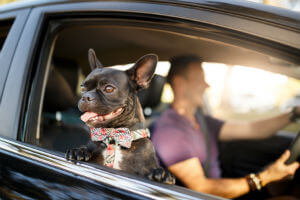
Taking a pet for a car ride is something many owners do each day. While it seems innocent enough to let your pet roam inside the vehicle and stick his or her head outside the window, unrestrained pets can cause a serious distraction and lead to an accident.
Our West Palm Beach car accident attorneys discuss why pets need to be restrained while traveling in order to drive safely on the road.
Reasons to Restrain Pets in Cars
While driving with an unrestrained pet is not illegal in Florida, doing so does pose some major dangers on the road.
Pets Become a Distraction
Loose pets roaming around a vehicle’s interior can create a significant distraction for drivers while on the road. Loose pets can climb back and forth in front of the driver, and even climb onto his or her lap. This distraction has the potential to cause an accident, harming yourself, your pet and other motorists.
Pets Can Be a Projectile
In the event of an accident, and unrestrained pet can become a projectile object within the vehicle cabin. According to the American Automobile Association (AAA), a 10-pound loose dog has the ability to exert roughly 300 pounds of pressure in a low-speed crash at 30 mph while a large 80-pound dog can exert roughly 2,400 pounds of pressure. The pet may sustain serious or deadly injuries, can injure others in the vehicle or even be ejected from the vehicle when an accident occurs.
Airbag Dangers to Pets
Smaller pets riding on drivers’ laps are at risk for airbag injuries when an accident occurs. The impact of a deploying airbag can cause death to a pet in the front seat. For the same reason babies and small children are kept in the back seat of a vehicle, pets should be as well.
Loose Pets After an Accident
If an accident occurs, injured and uninjured pets can feel quite scared. They may attempt to run away from the accident scene, which could lead the pet into traffic. A pet may be killed by an oncoming vehicle after surviving a car accident.
Common Pet Restraints
There are a variety of restraints available for the safe transport of pets in a vehicle. These restraints help keep pets secure in back seats, avoiding driver distraction.
- Keep animals crated in the back seat of the vehicle while traveling.
- Use a harness that buckles into the seat belt of the back seat. Look for a crash test-certified harness, certified by the Center for Pet Safety.
- Pet seat belts are much like harnesses, created to integrate with a vehicle’s existing seat belt system.
- For smaller pets, use a pet booster seat to raise the animal to the correct height for the safe use of harness and seat belt systems.
- Use a mesh barrier to prevent animals from climbing from the back to the front of the vehicle.
Ways to Drive Safely with Pets
Many pets love travelling, and their owners enjoy the company just as much. In addition to the use of pet restraints, the following can help you travel safely in the car with your beloved pet.
- Make sure your pet has proper ID tags on its collar in case of an emergency.
- Make sure your pet’s microchip information is up to date before traveling.
- Start with shorter car rides, working up to longer trips to ease pet stress and anxiety.
- Never leave your pet unattended inside of a vehicle.
- Do not allow pets to stick their faces or other body parts out the window. The pet may be injured by objects outside the car, and the wind can blow grit and debris into their eyes. The harsh wind can also cause mucous membrane irritations.
- Never transport a pet in the bed of a pickup truck.
Pet Restraint Laws in Florida
Currently, there are no Florida laws restricting driving with animals in a vehicle. There are no laws regarding the use of animal restraints. However, pet restraint laws and those limiting driving with pets are being considered in several states across the country.
Contact Our Licensed Attorneys Today
If you have been injured in an accident caused by a distracted driver, contact our licensed attorneys at Gordon & Partners. We have helped many car accident victims recover maximum compensation for their medical bills, lost wages, and pain and suffering and other damages.
We offer a free consultation to determine if you have a valid claim. We charge no upfront fees, and payment is only due if we successfully recover compensation for you.
Call 1 (855) 722-2552 or complete our free online form now.

 1-855-722-2552
1-855-722-2552